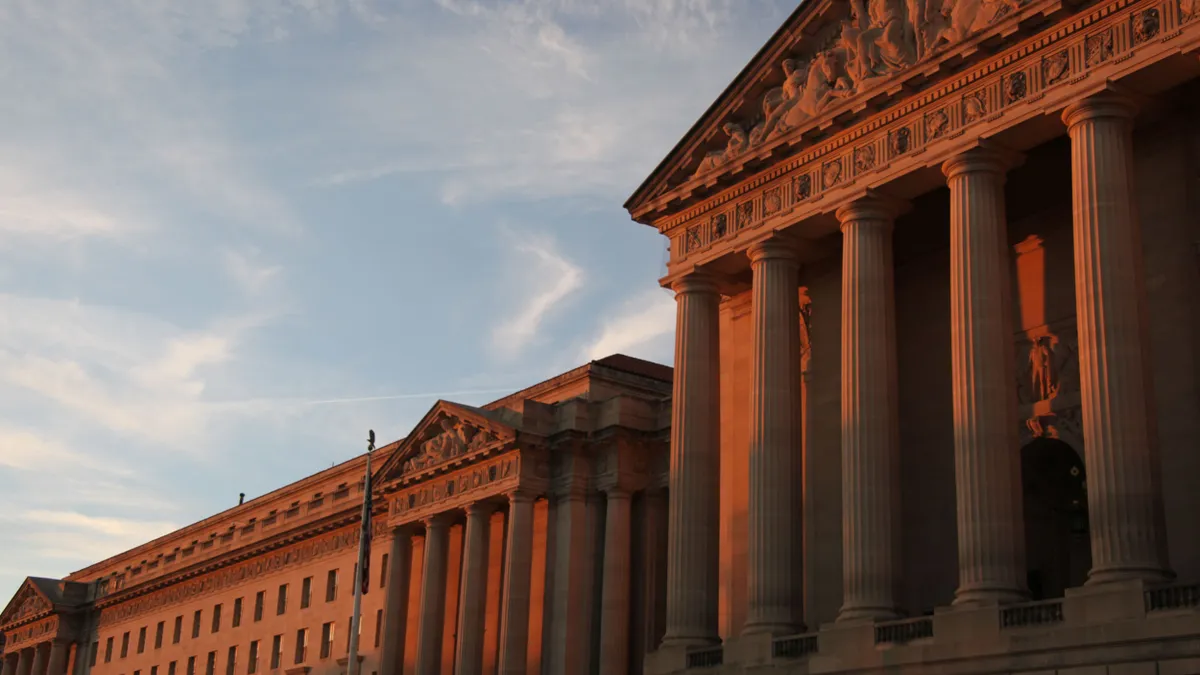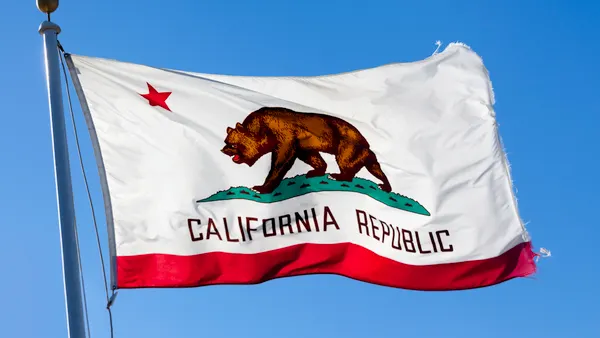UPDATE: July 1: The U.S. EPA is set to end its "enforcement discretion" policy on Aug. 31, according to an agency memo. The agency cited the adjustment of pandemic-related policies across the country as the rationale behind its decision.
"As state and local restrictions are relaxed or lifted, so too may the restrictions that potentially impede regulatory compliance, reducing the circumstances in which the temporary policy may apply," wrote EPA Assistant Administrator for Enforcement and Compliance Assurance Susan Parker Bodine. She noted a "period of adjustment" will also occur as states reopen, and said the late August deadline will allow that phase to play out.
Dive Brief:
- Nine states are pushing back on the U.S. EPA's moves to relax environmental oversight due to the new coronavirus pandemic. Attorneys general for New York, California, Maryland, Illinois, Michigan, Minnesota, Vermont, Oregon, and Virginia raised the issue in a brief sent June 8 to the U.S. District Court for the Southern District of New York.
- Those states are asking the court to issue a preliminary injunction that would halt the EPA's "enforcement discretion" policy, announced in March. The states filed a lawsuit in May arguing the policy is too expansive and vague. Spokespersons for the Maryland and New York attorneys general told Waste Dive this new brief supports the same case.
- Oversight largely falls to states without EPA enforcement. Documentation compiled by the National Waste and Recycling Association (NWRA) and reported by NPR shows industry requests for enforcement relief in mutliple states. NWRA Vice President of Communications Brandon Wright told Waste Dive the group generally does not comment on ongoing litigation and it is not tracking how waste and recycling operations have responded to EPA’s compliance policy during the pandemic.
Dive Insight:
When EPA rolled out the enforcement discretion policy earlier this year, the agency said it was accounting for health and public safety. The policy — which forgives companies that fall into noncompliance due to the pandemic — applies specifically to civil violations that occur during the crisis and addresses areas of noncompliance differently.
A March 26 memorandum stated the policy would apply retroactively from March 13, and referenced "constraints on the ability of a facility or laboratory to carry out certain activities required by our federal environmental permits, regulations, and statutes." Among other duties referenced, like monitoring air emissions and drinking water standards, EPA singled out hazardous waste management while stating separate protocols would apply to Superfund and Resource Conservation and Recovery Act (RCRA) sites.
While EPA said all entities should make an effort to comply with current regulations, the agency allowed noncompliance along with specific documentation of any actions taken due to COVID-19.
"After this policy is no longer in effect, the EPA expects full compliance going forward," the agency stated in the document, along with saying it did not anticipate asking facilities to "catch-up" on any missed monitoring or reporting if underlying requirements applied to periods of less than three months.
An EPA spokesperson declined to comment on the ongoing litigation or provide details to Waste Dive about whether any waste and recycling entities have utilized the enforcement discretion policy. Because of the enforcement discretion policy, state environmental authorities are the only official source of information regarding any companies that have sought compliance relief.
NWRA has pushed for broad regulatory relief during the pandemic. In March, the organization sent a letter to state agencies asking for exemptions on issues ranging from tonnage limits and service hours to disposal bans and compliance timelines.
"Regulations often govern timelines for completing tasks such as sampling," the letter from CEO Darrell Smith read. "When delaying these tasks or missing timelines do not result in environmental impacts, enforcement of these provisions should be suspended."
At the time of the EPA policy announcement, several environmental advocates told Waste Dive they had concerns about how it might allow the industry to evade pollution and contamination monitoring. But many were unsure of what the long-term ramifications might be or if any companies might utilize the policy.
Some experts in the waste industry indicated the noncompliance option could be beneficial at a time when public health concerns are taking precedence for many operators. Others said it would have little effect on their daily operations. Pat Sullivan, a senior vice president with SCS Engineers, told Waste Dive in late March his firm had reviewed the guidance, but that it was unlikely to alter its work. As of this week, he said little had changed.
"We have seen some limited use of COVID-19 as justification to extend deadlines and agencies have been willing to do that," Sullivan said via email. "But no major pushes to delay or avoid compliance or to invoke EPA’s policy."
The attorneys general behind the lawsuit say EPA's actions will disproportionately impact low-income communities of color. In a press release announcing the new legal action, they linked COVID-19 and air pollution, saying the combination would exacerbate health issues in communities near industrial sites.
“Right when the health of our communities is suffering the most, the Trump EPA is turning its back on them, greenlighting industry to pollute more and care less," said New York Attorney General Letitia James in a statement.
Those nine states are not the only players taking action against EPA's enforcement policy. A separate lawsuit over the discretion policy is also underway. In April, the Natural Resources Defense Council and 14 other environmental organizations similarly sued EPA over the decision in the U.S. District Court for the Southern District of New York.















